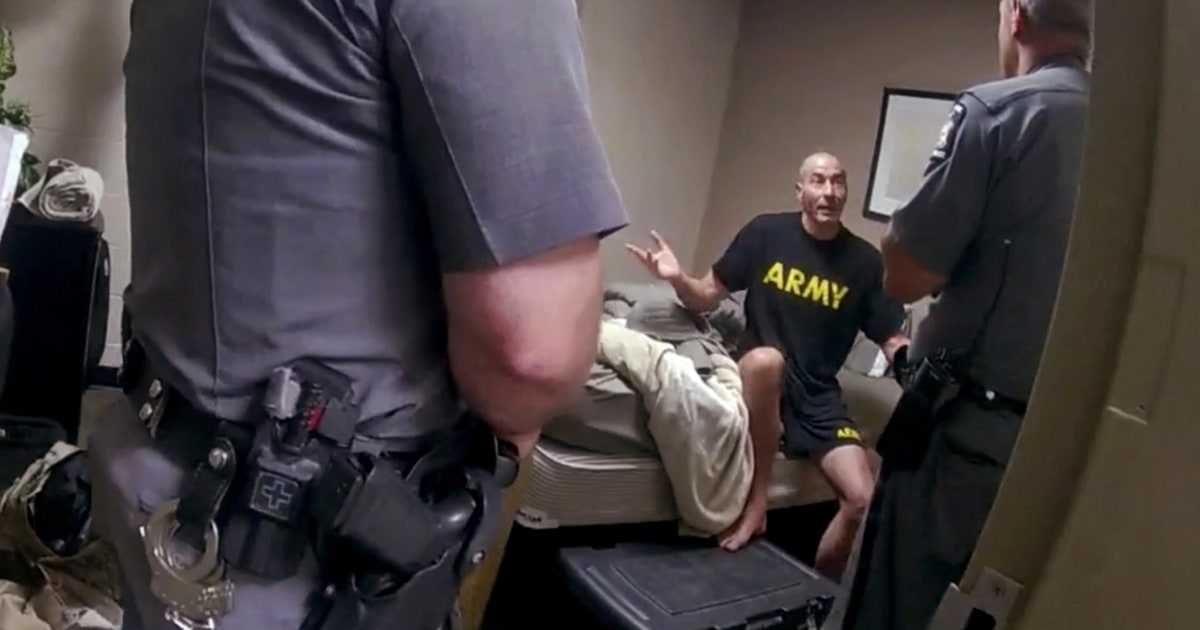Boulder Shooting: Talk to CNN Known Suspect 1:11
(CNN Spanish) -
Americans have been saying for a year that they want to return to normalcy.
Yet in a tragic way, that wish is being fulfilled.
With the gradual return to public places comes a problem that the country was more than willing to put aside as it grappled with a pandemic capable of killing thousands of Americans a day.
Mass shootings are making headlines again, and while his return is highly unpleasant, it proves to be an inextricable part of life in America.
The most recent mass shooting left 10 people dead in a supermarket.
For the past 12 months, Americans have been cautious in grocery stores to avoid spreading the virus.
Monday's killings in Boulder, Colorado, reminded that even with hopes on the horizon of overcoming the pandemic, they must remain vigilant for a different reason.
Americans shouldn't have to worry about dying in a supermarket, spa, or anywhere else.
Taking a bullet should be a distant thought, but with the return to normal comes the reality that anyone could die for nothing, virtually anywhere.
LOOK: What we know about the mass shooting suspect in Boulder, Colorado: Ahmad Al Aliwi Alissa
Seven mass shootings in seven days
Just when the country seems to beat a new pandemic, an old, familiar epidemic returns.
The past week has been a harbinger of what "getting back to normal" means for America.
advertising
The latest wave of senseless gun violence began on March 16 when a shooter killed eight people in three Atlanta spas.
The next day, a vehicle in Stockton, California, injured five people who had gathered for a vigil.
Four people were hospitalized Thursday after a shooting in Gresham, Oregon.
On Saturday, a pair of club shootings in Dallas and Houston left a young woman dead and 12 people injured.
Soon after, a shooter opened fire on what Philadelphia police called an illegal party, killing one man and wounding five more.
And now, Boulder scored the seventh in seven days.
When the shooting at King Soopers stopped, ten people were dead, including the heroic Constable Eric Talley, the first cop on the scene.
His wife and seven children will pay an astronomical debt for their father's bravery.
"Flags at half mast after the tragic shooting in Atlanta that claimed eight lives and now the tragedy here, close to home, in a grocery store that could be any of the stores in our neighborhood," said the governor of Colorado on Tuesday, Jared Polis.
The King Soopers where the incident occurred is one of roughly 1,000 vendors in Colorado working to repel the deadly covid-19.
Steven McHugh's son-in-law had lined up for a dose of the virus vaccine, like more than a million Coloradans.
He was third in line and his daughters chatted with their grandmother on the phone while he waited, McHugh said.
When shots were fired, a bullet struck a woman at the front of the line.
His condition is unclear, as is much of what happened that Monday there.
Authorities haven't released a motive, but history tells us it won't make sense.
McHugh's son-in-law fled with the girls, one in seventh grade, the other in eighth, to an upstairs staff area above the pharmacy and hid in a closet.
Dozens more shots rang out, McHugh said, citing his son-in-law.
It was "extraordinarily scary," Grandpa told CNN, "and of course the little boy said, 'The coats weren't long enough to hide our feet,' as they were standing behind the coats in the closet."
This is what the rifle used in the Colorado massacre sounds like 2:15
'A normality that we can no longer afford'
The US government does not have a centralized database to track mass shootings, but facts indicate that they were reduced during the pandemic as Americans were encouraged to stay home and many of their favorite hangouts were closed.
Former President Barack Obama called for action on Tuesday, expressing disbelief that only COVID-19 can quell the gun violence the country has long endured.
"The only pandemic in a century cannot be the only thing stopping mass shootings in this country," he said.
“We should not have to choose between one type of tragedy and another.
It is time for leaders everywhere to listen to the American people when they say enough is enough, because this is something normal that we can no longer afford. "
For the mass shootings that occurred amid the pandemic, their locations were terrifyingly familiar: a Buffalo, Minnesota health clinic;
a bowling alley in Rockford, Illinois;
a shopping center in Wauwatosa, Wisconsin;
parties in Rochester, New York and Washington, DC;
and a brewery in Milwaukee where, authorities would later learn, the gunman had been an employee.
Gun violence is not a uniquely American phenomenon, but part of the rich American tapestry of evil and violence: people (mostly men) using guns (often firearms) to kill innocents.
Sometimes they are mentally ill, but more often they are simply angry or vicious.
Motives - when they at least exist - do not provide closure.
Outrage invariably arises after each massacre.
One side calls for stricter regulation of weapons.
They are branded anti-American.
Opponents enact the Second Amendment.
They are classified as insensitive.
Then there is a stalemate until the next kill, and then this repeats.
An hour after the Boulder killings, the National Rifle Association tweeted the Second Amendment.
He later retweeted it.
Nothing more.
MORE: Biden Asks Senate To Pass Gun Control Reforms After Colorado Mass Shooting
It should come as no surprise that this special interest group advocates for the Second Amendment.
The amendment is a promise to all Americans, but 15 years before its ratification, the Declaration of Independence brought other promises of rights considered "inalienable."
Agent Talley, Tralona Bartkowiak, Suzanne Fountain, Teri Leiker, Kevin Mahoney, Lynn Murray, Rikki Olds, Neven Stanisic, Denny Strong, Jody Waters, will never achieve full guarantees of "life, liberty, and the pursuit of happiness," or any of the thousands of victims who fell before Monday in Boulder.
'Part of the American experience'
It is highly likely that someone else was killed by a firearm as you read this.
Despite the massive media focus on mass shootings, gun violence takes myriad and frequent forms.
According to figures from the Centers for Disease Control and Prevention, the country had 14,414 homicides in 2019, about one every 36 minutes, while another 23,941 people fatally shot themselves, about one every 22 minutes.
In his statement, Obama named other scapegoats: discontent, misogyny, hatred.
The United States does not have exclusivity on any of these, but it does have special marks that can be pernicious.
Sandy Phillips, who co-founded the organization Survivors Empowered to comfort and guide survivors of gun violence, pointed to victims that they suffer in silence, because the murders of their loved ones apparently are not important enough for the newspapers or the nightly news. .
Do you doubt her?
Google the details about last week's shooting in Stockton, California, one of the most racially diverse cities in the nation.
"We have mass shootings on camera every day in this country, in other neighborhoods that never get the press, that never get a chance to talk about what's going on in their communities, and we have to change that," Phillips told CNN, who lost his 24-year-old daughter Jessica Ghawi in 2012 to gun violence in Aurora, Colorado.
Those neighborhoods are often minority-owned, who have also been through a particularly difficult time with the pandemic.
It's another crushing American axiom that societal ills tend to affect people of color, and those victims must scream much louder to be heard.
There will be a lot of screaming in the next few days, maybe weeks.
Obama is right when he said that Americans have the ability to "make it difficult for those who have hatred at heart to buy weapons of war.
We can overcome the opposition of cowardly politicians and the pressure of an arms lobby that is opposed to placing any limit on the ability of anyone to assemble an arsenal.
MORE: Hear Witnesses to the Colorado Shooting Share Their Experience
However, the margins are thin and the complexity of that American tapestry will show.
A Gallup poll from late last year showed that 42% of Americans had guns in their homes, a number that has increased since 2019. Another Gallup poll indicated that 57% of Americans want stricter gun laws, a percentage that decreases.
Former FBI Deputy Director Andrew McCabe said "absolutely nothing" will stop the country from returning to mass pre-pandemic violence if lawmakers refuse to restrict access to weapons.
"This has become part of the American experience, and let's not forget: it is completely unique to us," he told CNN.
“There is no other similar country on Earth that experiences the same number, frequency of mass shootings as we do, and it is directly attributable to the profusion and availability of weapons, particularly high-powered assault-style weapons and the ease with which that anyone can buy them in this country.
Guns in America Shooting in Colorado





/cloudfront-eu-central-1.images.arcpublishing.com/prisa/IX55AG6KLJD5NOGIRDL4Z3JOAU.jpg)







